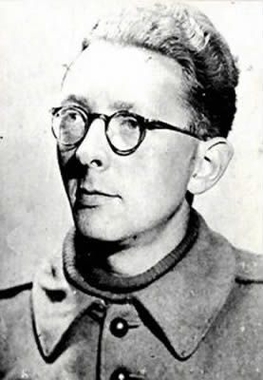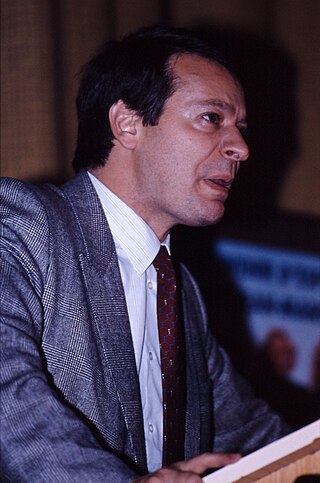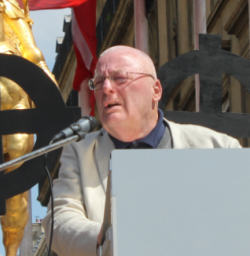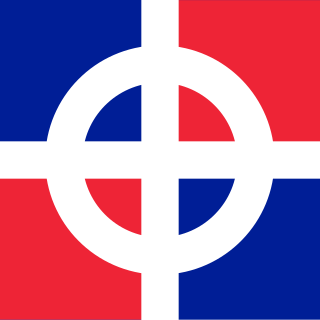Related Research Articles

Occident was a French far-right militant group, active in France between 1964 and 1968 and considered the "main activist group on the extreme right in the 1960s". Occident activists were known for their "commando" actions against various "enemy" targets, such as left-wing students, PCF offices, immigrant associations, and anti-colonialists. A number of former Occident members later became prominent figures in mainstream right-wing parties; some even obtained ministerial positions. The movement was banned by the French authorities in October 1968, following violent confrontations with left-wing groups during the May 1968 events.

Alain de Benoist, also known as Fabrice Laroche, Robert de Herte, David Barney, and other pen names, is a French political philosopher and journalist, a founding member of the Nouvelle Droite, and the leader of the ethno-nationalist think tank GRECE.
The Groupement de Recherche et d'Études pour la Civilisation Européenne, better known as GRECE, is a French ethnonationalist think tank founded in 1968 to promote the ideas of the Nouvelle Droite. GRECE founding member Alain de Benoist has been described as its leader and "most authoritative spokesman". Prominent former members include Guillaume Faye and Jean-Yves Le Gallou.

The French and European Nationalist Party was a French nationalist militant organization active between 1987 and 1999. Led by Claude Cornilleau until 1996, its slogan was "France first, white always". It had around a thousand sympathizers at its height.

François Duprat was a French essayist and politician, a founding member of the Front National party and part of the leadership until his assassination in 1978. Duprat was one of the main architects in the introduction of Holocaust denial in France.

Jeune Nation was a French nationalist, neo-Pétainist and neo-fascist far-right movement founded in 1949 by Pierre Sidos and his brothers. Inspired by Fascist Italy and Vichy France, the group attracted support from many young nationalists during the Algerian war (1954–62), especially in the French colonial army. Promoting street violence and extra-parliamentarian insurrection against the Fourth Republic, members hoped the turmoils of the wars of decolonization would lead to a coup d'état followed by the establishment of a nationalist regime. Jeune Nation was the most significant French neo-fascist movement during the 1950s; it gathered at its height 3,000 to 4,000 members.

René Binet was a French fascist political activist. Initially a Trotskyist in the 1930s, he espoused fascism during World War II and joined the SS Charlemagne Division. Soon after the end of the war, Binet became involved in numerous neo-fascist and white supremacist publications and parties. He wrote the 1950 book Théorie du racisme, deemed influential on the European far-right at large. Binet died in a car accident in 1957, aged 44.

Jean-Pierre Stirbois was a French far-right politician. Elected deputy mayor in 1983 of Dreux, a city of around 30,000 inhabitants at the time, he was one of the main architects, along with his wife Marie-France Stirbois, of the first electoral breakthrough of the National Front.

Pierre Sidos was a French far right nationalist, neo-Pétainist, and antisemitic activist. One of the main figures of post-WWII nationalism in France, Sidos was the founder and leader of the nationalist organizations Jeune Nation (1949–1958) and L'Œuvre Française (1968–2013).
Jean Costes, better known by his pen name Jacques Bordiot, was a French journalist and writer who focused mainly on anti-Masonic conspiracy theories.

Pierre Vial is an academic medievalist tied to the Jean Moulin University Lyon 3. A Nouvelle Droite leader, he is the founder of the far-right, neopagan association Terre et Peuple.

Terre et Peuple is a far-right and neo-pagan cultural association in France founded by Pierre Vial and launched in 1995. Its positions are close to the Identitarian movement, although it precedes that movement and its terminology.
Jean-Yves Camus is a French political scientist who specializes in nationalist movements in Europe.
The Federation of Nationalist Students was a French far-right student society active between 1960 and 1967, founded by François d'Orcival and others, soon joined by Alain de Benoist as a lead journalist.
The European Rally for Liberty, also translated as European Assembly for Liberty, was a far-right, white nationalist and euro-nationalist party active in France between 1966 and 1968, and the political showcase of the Nationalist Movement of Progress, created nine months earlier. The movement and the party were founded by the euro-nationalist magazine Europe-Action, escorted by militants from the Federation of Nationalist Students.
Europe-Action was a far-right white nationalist and euro-nationalist magazine and movement, founded by Dominique Venner in 1963 and active until 1966. Distancing itself from pre-WWII fascist ideas such as anti-intellectualism, anti-parliamentarianism and traditional French nationalism, Europe-Action promoted a pan-European nationalism based on the "Occident"—or the "white peoples"— and a social Darwinism escorted by racialism, labeled "biological realism". These theories, along with the meta-political strategy of Venner, influenced young Europe-Action journalist Alain de Benoist and are deemed conducive to the creation of GRECE and the Nouvelle Droite in 1968.

L'Œuvre Française, also called L'Œuvre, was a French nationalist, néo-Pétainist and antisemitic far-right movement founded in 1968 by Pierre Sidos. Inspired by the "semi-fascist" regimes of Vichy France, Francoist Spain and the Estado Novo, L'Œuvre Française was—until its dissolution by the authorities in 2013—the oldest nationalist association still active in France.
Pierre Bousquet was a French journalist and far-right politician. A former section leader (Rottenführer) in the Waffen-SS Charlemagne Division, Bousquet was the first treasurer and a founding member of the National Front in 1972.

Jean-Claude Valla was a French journalist and a prominent figure of the Nouvelle Droite.

Michel Marmin is a French journalist and film critic.
References
- 1 2 Camus & Monzat 1992, p. 89.
- ↑ Charpier 2005, pp. 95–96.
- ↑ Charpier 2005, pp. 143, 205.
- ↑ D'Appollonia 1998, p. 315.
- ↑ Milza 2002, p. 134.
- ↑ Milza 2002, p. 142.
- ↑ Charpier 2005, p. 217.
- ↑ Charpier 2005, pp. 221–222.
- ↑ D'Appollonia 1998, p. 350.
- 1 2 3 4 Camus & Monzat 1992, p. 90.
- ↑ Milza 2002, p. 142–143.
- ↑ Camus & Lebourg 2017, pp. 135–136.
- ↑ Gautier 2017.
- ↑ Camus & Monzat 1992, p. 341.
- ↑ Charpier 2005, p. 343.
- ↑ LJ Jean-Gilles Malliarakis 23/2, radio-courtoisie.over-blog.com, 23 février 2007
- ↑ Faye, Olivier; Mestre, Abel; Monnot, Caroline (19 October 2016). "La mairie de Paris exfiltre un colloque sur l'islamisme organisé avec Jean-Gilles Malliarakis". Le Monde (in French).